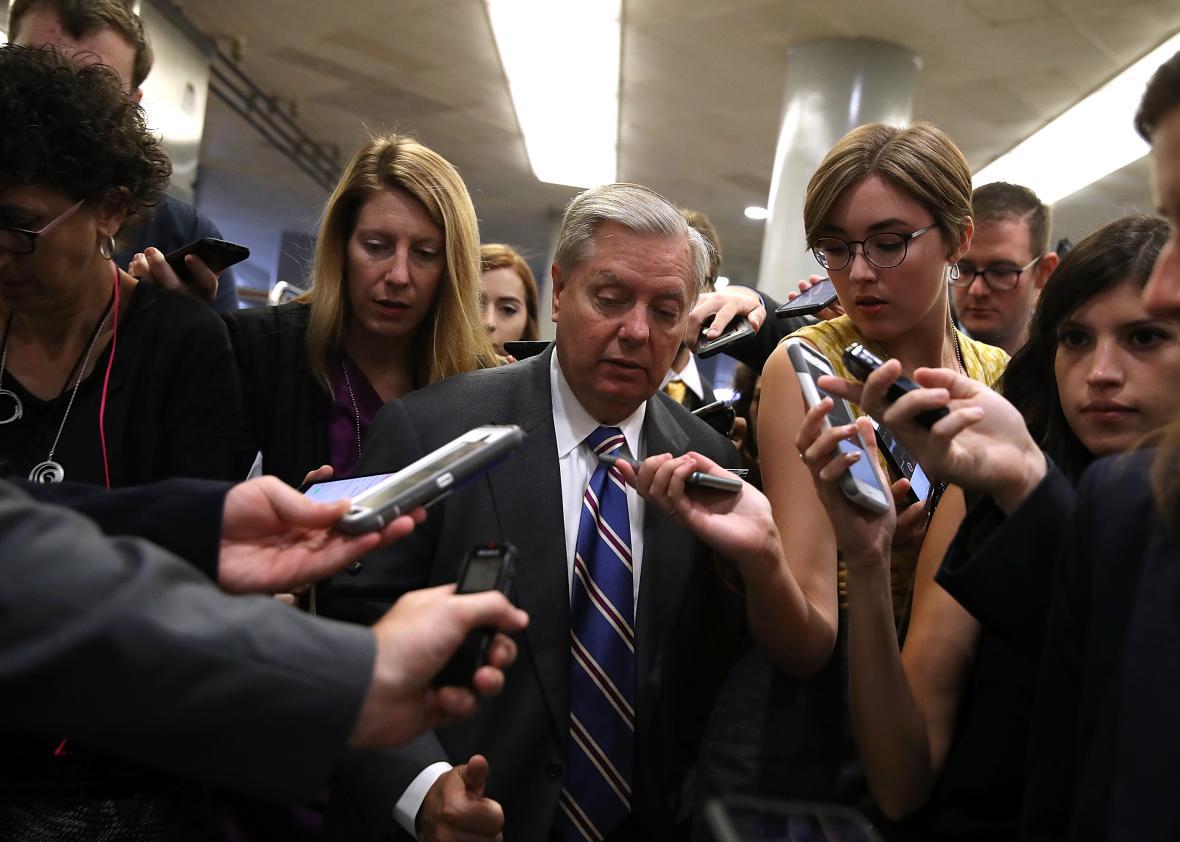The United States Senate, ahead of its big health care vote expected late Thursday night, is paralyzed with fear: the fear that a bill they pass could become law.
Senate Republicans have been trying to treat the passage of their bill—the still-unfinished “skinny repeal,” which the White House is now trying to rebrand as the “freedom bill”—as a procedural vote, something that would kick the health care negotiations into a conference committee between the House and Senate. Few of them express any interest in seeing this bill, the skinny repeal/freedom bill, which at the very least would repeal the individual mandate, become law, because it would wreak havoc on insurance markets.
The problem for these senators is that there’s a little-known provision in an obscure 18th-century document called the United States Constitution that says if the Senate passes a bill, and then the House of Representatives also passes it, it goes to the president’s desk for a signature—to become law. How can senators who don’t want the bill they pass to become law be sure that the House wouldn’t just take it up and pass it, as this Constitution authorizes them to do?
The best they can hope for is the word of those who could block the House from passing it. South Carolina Sen. Lindsey Graham, who very much doesn’t want the skinny bill to become law, said that in order to vote for it tonight, he needs verification that the House will go to conference. He approvingly cited House Freedom Caucus Chairman Mark Meadows’ view that the skinny repeal would be dead on arrival in the House.
But Meadows is just one guy, and he may not be speaking for the rest of the group. I asked another Freedom Caucus member, Arizona Rep. Trent Franks, how he would vote if the choice were between a bill repealing the individual mandate, which the skinny bill does, and nothing. He said he wouldn’t pick, because he didn’t want to influence the Senate.
In order to settle senators’ nerves, Graham said, Senate Majority Leader Mitch McConnell told members during lunch that he had gotten a commitment from House Speaker Paul Ryan that the House would go to conference. But there are some signals that McConnell’s claim may be … not true? An untruth? The House majority leader’s office, for example, sent out the following advisory Thursday afternoon:
While last votes are currently scheduled to take place tomorrow, please be advised that—pending Senate action on healthcare—the House schedule is subject to change.
Further information regarding potential additional items will be relayed as soon as possible.
What possible votes might the House keep members in town for, that depend on “Senate action on health care” Thursday night? Multiple members of the House whip team, too, have told reporters that House action on skinny repeal could be forthcoming. Further, Paul Ryan’s spokeswoman, in a statement to the Hill, described going to conference as “one option under consideration.”
Does it sound to you like senators have ironclad verification that the bill they don’t like but are considering passing (in a few hours, or whenever they finish writing it) would never be taken up by the House? Me neither.
It’s important to keep in mind, too, that even if the House did opt to go to conference, but then House and Senate members couldn’t reach a conference agreement, the fallback option would still be for … the House to just pass the skinny bill.
It shouldn’t need to be said, but it is not wise to pass bills that you do not want to become law.
Update, 6:03 p.m.: Senators Graham, John McCain, and Ron Johnson just delivered a press conference threatening to vote no on skinny repeal if they don’t get the proper “assurances” from House leaders that they intend to go to conference. When asked what counts as an acceptable assurance, Graham said that “it’s like pornography, you know it when you see it.” In other words, Paul Ryan must pinky-swear that he will go to conference, or the Senate bill could go down.
For the latest developments in Senate health care news, follow our live blog.
